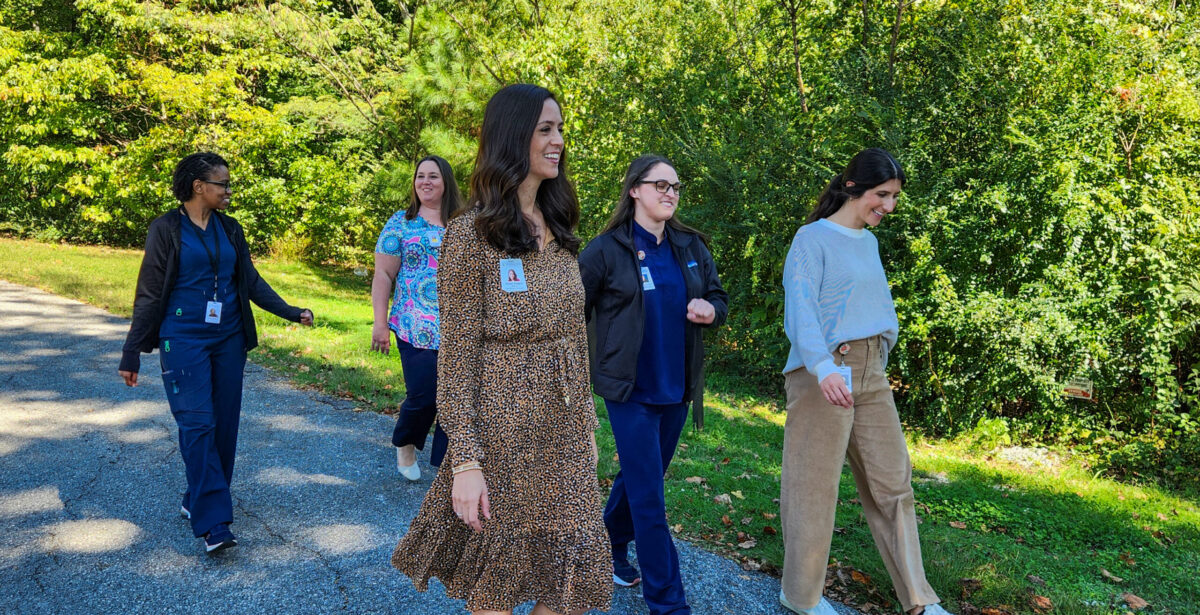Sleepless in Birmingham? Find out from local experts what you can do
Reading time: 8 minutes
Sponsored

How often do you wake up feeling more tired in the morning than the night before? Lack of quality sleep impacts way more than your mood—it can have major long-term health consequences. To find out how to sleep like a baby, we talked with the experts at Brookwood Baptist Health.
Why Sleep Matters

Ask anyone who’s ever been sleep deprived how they felt when they weren’t getting enough sleep. (Parents of babies and college students, we’re looking at you.) Chances are, you’ll hear answers like “I couldn’t think” or “I felt like a zombie.”
When the same person’s had a great night’s sleep, their tune changes completely. “I’m like a new person,” or “everything’s so much easier now.”
The difference between sleep-deprivation and being well-rested is literally night and day.
A lot of people don’t realize there are solutions for common sleep problems. So we caught up with Shanna Rooks, Dr. H. Andrew Wilson, Jr. and Dr. Bishop Kelley of Brookwood Baptist Health.
They talked to us about the five most common sleep problems and filled us in on what you can do if you or someone you know can’t catch those essential zzz’s. 😴
The Biggest Risks if you’re Sleepless in Birmingham

“Sleep health has been a growing field for 30 years and is increasingly recognized as one of the major pillars of overall health—just like exercise and weight control. Ideally, sleep represents one third of your life, so it only makes sense that what is going on would have a substantial impact on your overall health.”
Dr. H. Andrew Wilson, Jr.
The first thing I asked Dr. Wilson and Dr. Kelley about was the risks people face from getting too little sleep. Their answers ranged from the familiar to the sobering:
- Daytime irritability—meaning crankiness + a short fuse.
- Lack of concentration + lost productivity (been there done that).
- Sudden daytime sleep attacks—particularly dangerous if you’re driving, say, an 18-wheeler.
- Increased appetite and weight gain.
- Cognitive problems, including short term memory loss.
- Cardiovascular death. Read about one local heart patient’s story here.
“We know now that not getting a good night’s sleep is bad for your health. It can lead to high blood pressure, heart disease, kidney disease, diabetes, stroke and possibly cancer. Not getting a good night’s sleep over a long period of time may also lead to dementia and Alzheimer’s.”
Dr. Bishop Kelley
It’s hard to believe sleep can impact so many parts of our health. The good news is, most sleep disorders are easily treatable.
Common Sleep Disorders + Symptoms
According to Dr. Wilson, insomnia is the number one most common sleep disorder, with obstructive sleep apnea as number two.
The other three in the top five include:
- Narcolepsy (remember those sudden sleep attacks?)
- Restless Leg Syndrome (RLS)
- Periodic Limb Movement Syndrome (PLMS)
“Typical symptoms include feeling unrested, morning headaches and sleepiness during the day. It’s important to talk over any symptoms with your physician and see if it’s worth pursuing a sleep study.”
Dr. H. Andrew Wilson, Jr.
Sleepless in Birmingham? Take the Assessment
If this sounds like you or somebody you know, your first step is easy. Take the quick assessment to see what’s up when you lay your head on your pillow. Or, talk with your primary care physician.
You’ll likely need to see a board-certified sleep physician first. They will order a sleep study for you if that’s the logical next step.
Everything you always wanted to know about a sleep study but were afraid to ask
I don’t know about you but whenever I’ve imagined a sleep study, I imagine lying down on a cold metal bed under harsh bright lights, hooked up to electrodes while someone watches you sleep. Turns out, it’s not at all like that.
Where it happens:

Within Brookwood Baptist Health, you’ve got four in-hospital options:
- Brookwood (6 beds)
- Princeton (6 beds)
- Shelby (6 beds)
- Citizens (2 beds)
Some patients also have the option of doing an in-home sleep study.
What to expect:
You usually show up between 7-8PM, depending on your schedule (they do have accommodations for people who work third shift).
First, the tech orients you to your private room (it looks a bit like a hotel room) and explains what’s about to happen.
Then they hook you up to an EEG. They’ll use this to watch your brain pattern, heart rate and rhythm, respiratory patterns, body movements and oxygen levels.
According to Dr. Wilson, who has been through several sleep studies of his own, “People may feel like they would never go to sleep in such an environment, but most do long enough for us to get the information we need.”
If you are there for only one night, they watch you sleep and monitor all the indicators.
Sometimes, they can diagnose sleep apnea (known officially as “obstructive sleep apnea”) on the first night and get you started on a CPAP that night.
In most cases, you go home the next morning, then follow up with the sleep physician afterwards to find out what’s going on and if a CPAP or another therapy is the next step.
If you have sleep apnea

If they discover severe sleep apnea, they treat you with a CPAP (continuous positive airway pressure) machine that same night.
If you’ve heard stories about how much your uncle hates his CPAP machine, never fear. They’ve come a long way in the last ten to twenty years, according to Dr. Wilson. Machines now include comfort features that can make your experience much better than in the past.
Sometimes for mild to moderate sleep apnea, they’ll have you come in for a second night and test to see if you qualify for a CPAP machine. If you do, they’ll put it on at low pressure and adjust to whatever your body needs to breathe.
“Dental appliances are also an alternative treatment for mild to moderate sleep apnea,” said Dr. Wilson.
The experts at Brookwood Baptist Health are happy to work with you to make sure you have a good experience.
If you have insomnia
According to Dr. Kelley, the first thing they’ll do is make sure there’s nothing physically wrong that’s keeping you awake.
Then, they start with cognitive behavioral treatments to see if they can help you get a better night’s sleep.
Dr. Wilson outlined some common sleep hygiene practices that can help anyone sleep better, whether or not you suffer from insomnia:
- Avoid caffeine in the afternoon and evening.
- Avoid alcohol for two to three hours before bed.
- Exercise regularly.
- Don’t spend excessive time in bed and use the bed only for sleeping.
- Delay bedtime to line up the time you are asleep with the time you are in bed.
- Avoid daytime napping outside the bedroom, whether on the couch or in a recliner.
“If these interventions don’t work, we’ll turn to medication,” said Dr. Kelley. “But that’s down the road, or as a last resort.”
If you have something else
They’ll diagnose and treat as needed.
What happens when you’ve gotten a handle on your sleep issues
We know all the scary things that can happen if you’re not getting good quality sleep on a regular basis. But what about after you’ve gone through the sleep study and turned things around?
“The majority of people benefit in terms of daytime alertness. They often feel like they sleep more soundly at night and generally feel more productive during the day.
It’s very common to have people in their 40s and 50s come in with memory loss, thinking they have early dementia, and it turns out they have untreated sleep apnea. They find their focus and memory improve once it’s been addressed.”
Dr. H. Andrew Wilson, Jr.
“Once people get to where they’re having a better night’s sleep, they feel a whole lot better. They’re not tired or sleepy during the day. They see a lot of improvement in health issues they had before.
Finally, a lot of people have trouble losing weight because they are sleep deprived. Once they get enough sleep, they begin to be able to lose some weight.”
Dr. Bishop Kelley
Are you ready to say goodbye to sleepless nights? Take the sleep assessment now and begin your journey to better sleep.
Want more informative articles like this delivered straight to your inbox? Sign up for Bham Now’s free, fun + informative newsletter today.
Sponsored by:






 11001 views
11001 views